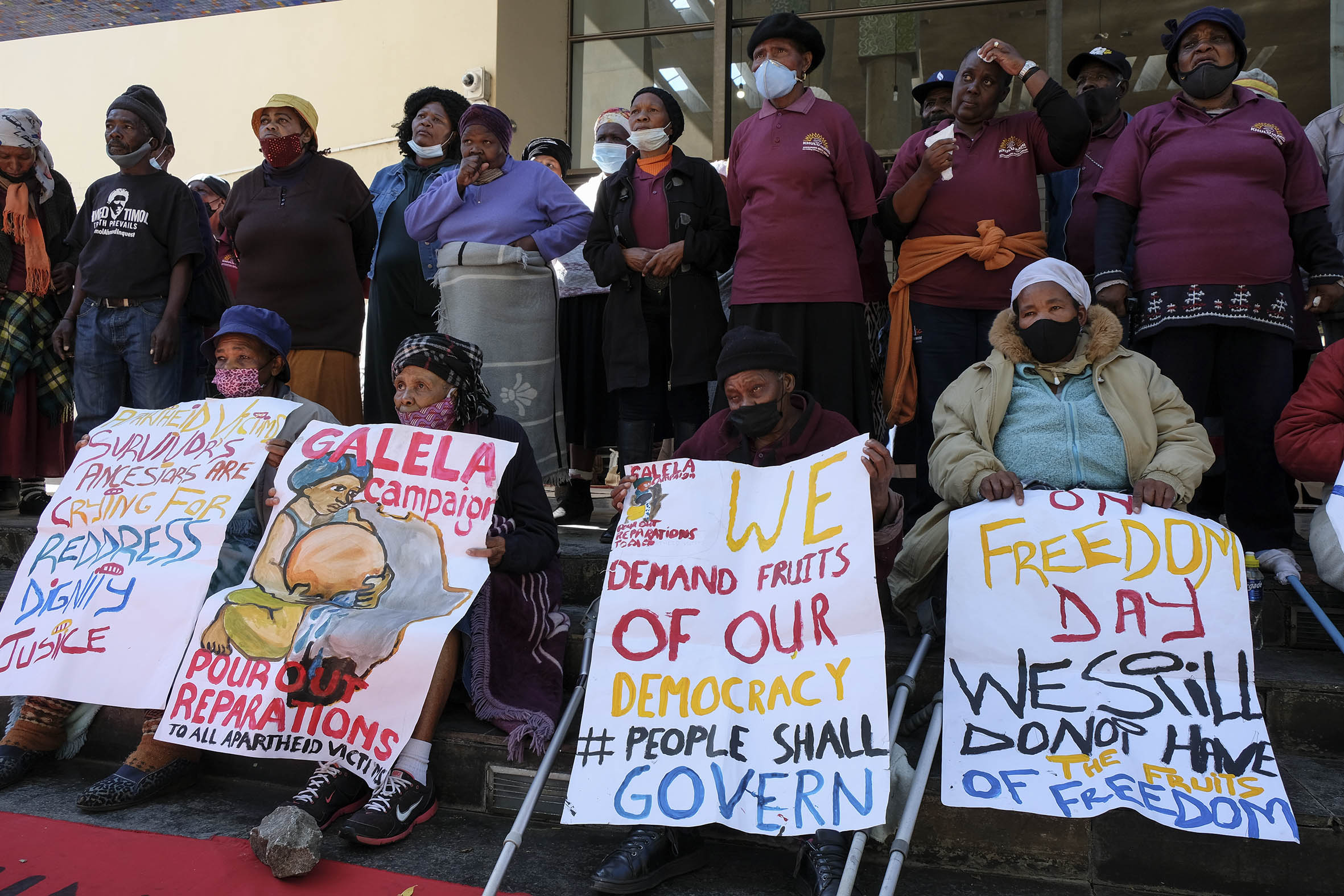No money to pay you, apartheid survivors are told
Activists demanding reparations for apartheid crimes finally met with the justice minister, who informed them that the TRC list of beneficiaries will not be expanded.
Author:
11 May 2022

An occupation of the Constitutional Court in Braamfontein, Johannesburg, looks set to continue into its third week after survivors of apartheid crimes and Minister of Justice and Correctional Services Ronald Lamola failed to reach an understanding on 10 May regarding the payment of reparations.
The more than 70 survivors, who are members of the Khulumani Support Group, a non-governmental organisation advocating for the redress of apartheid crimes, have been sleeping rough since they first occupied the steps of South Africa’s apex court in late April. Both Lamola and his deputy, John Jeffery, apologised for the conditions under which they had kept the occupiers waiting. Many of the mostly elderly occupiers have fallen ill while sleeping in the cold on pieces of cardboard outside the court.
Speaking in isiZulu, Lamola said: “This is the first chance we have had [to meet with you] because you did not give us notice, you just arrived. We’re sorry for the 13 days you have been sleeping here, but it was out of our hands. It wasn’t our aim for you to all sit here for 13 days in winter, so we are very sorry for that. We know it’s not an easy thing, especially for older people. Me, myself, I wouldn’t survive here.”


But apologies notwithstanding, the occupiers and Lamola’s department appear no nearer to an agreement on how outstanding Truth and Reconciliation Commission (TRC) reparations should be managed. Their continued disagreement has exposed the fraught and festering legacy of the commission.
Lamola would not commit to funds being used to pay for anything other than their current uses – primarily the education of the children of some victims of human rights abuses under apartheid. “I’m sorry for that, but it is beyond what the government is able to do. It is out of our hands … I can’t commit to paying money into your accounts. It would be a lie.”
In an interview, Lamola called the occupiers’ demands that they be paid reparations directly “impractical”. “We must be frank with them,” he said. “No other money will be paid.”
Blame the TRC
Lamola and Jeffery stressed that the TRC was responsible for the limited number of reparations beneficiaries. Yasmin Sooka, former member of the commission and a leading transitional justice expert, recently said that realising the promise of the TRC depended on Lamola’s department extending the list of beneficiaries.
The occupiers said Lamola and Jeffery’s blaming the TRC process failed to account for the commission’s own flaws. Dineo Makhura*, whose brother was abducted by a gang coordinated by the apartheid police before he was brutally murdered, said “people still had bullets in their bodies” at the time the commission’s enquiries were ended.
“How is it that the TRC closed when people were still injured?” she said. “How is it that the TRC closed before everybody was given what they needed? You’re talking about a closed list when children in our communities haven’t been able to go to school.”
“You’re treating that money like you own that money,” added Thabo Shabangu. “You don’t own that money. It belongs to us.” The money Shabangu was referring to is the President’s Fund, which regularly receives a clean audit and has nearly R2 billion in total net assets, according to its most recent annual report.


“We can assure you that that money has not been stolen,” Jeffery told the occupiers, explaining that the funds were being kept aside for the reparations of two communities per province. “The money that’s left is only enough for two per province,” he added.
The occupiers – who have come to Braamfontein from the far reaches of Limpopo, Cape Town, Pretoria, Gauteng’s East Rand, Queenstown in the Eastern Cape – look set to remain on the steps of the court. One grandmother from Cradock explained that “then we were fighting for freedom; now we are fighting for relief … We have a different kind of blood. When we bleed, it isn’t red.”
She and her fellow occupiers are now demanding that President Cyril Ramaphosa address their demands in person.
*Not her real name.
